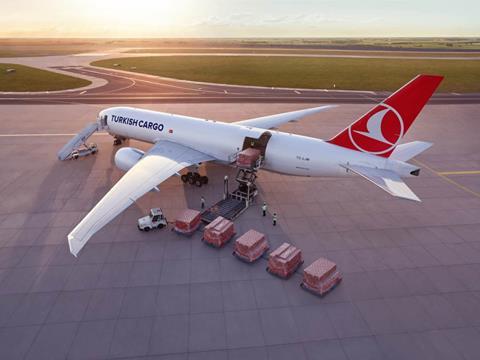Turkish Airlines Partners with WFS for Enhanced Cargo and Ground Handling Services
In a significant development within the logistics and aviation sectors, Turkish Airlines has selected Worldwide Flight Services (WFS) to oversee its cargo and ground handling operations at two pivotal U.S. airports—Miami International Airport (MIA) and John F. Kennedy International Airport (JFK). This strategic partnership is set to span three years, reflecting both companies’ commitment to bolstering their operations in one of the world’s most demanding aviation markets.
Under the recently signed agreement, WFS will manage an impressive annual volume of approximately 54,250 tonnes of Turkish Airlines’ cargo across these key locations. The collaboration commenced with WFS officially beginning its services at MIA on July 17 and at JFK shortly thereafter on August 1. These steps are indicative of Turkish Airlines’ continued commitment to expanding its operational footprint in North America, an essential market for international air cargo.
WFS will be responsible for a range of critical services encompassing cargo handling and mail processing, as well as ramp handling operations. At Miami International Airport, these services will be executed from building 707, while operations at JFK will take place in building 260. Turkish Airlines operates four weekly flights to MIA, facilitating the transport of approximately 18,250 tonnes of cargo. In addition, it operates three flights per week to JFK, contributing roughly 36,000 tonnes of cargo annually.
The ability of WFS to accommodate and service Turkish Airlines’ freighter fleet, which includes advanced aircraft such as the Airbus A330F and Boeing 747F and 777F, underscores the airline’s ambitions and operational scale. The integration of WFS’s ground handling expertise is expected to enhance the efficiency and reliability of Turkish Airlines’ services in the region.
Frank Clemente, Senior Vice President for Cargo and Express North America at WFS, expressed enthusiasm regarding the collaboration. He stated, “We are pleased to expand our partnership with Turkish Airlines across these two strategic US gateways. This contract reinforces our commitment to delivering the reliable, high-quality ground handling services that support Turkish Airlines’ growing cargo network in North America.” Such affirmations highlight how essential partnerships between airlines and ground handlers are in navigating the complexities of air freight logistics, particularly at significant international hubs like MIA and JFK.
This partnership is emblematic of a broader trend within the airline industry: the increasing reliance on specialized ground handling services to streamline operations and enhance service delivery. Efficient cargo handling is crucial in an environment where timely delivery influences customer satisfaction and operational efficiency, factors that are especially heightened in the competitive arena of air freight.
In addition to the newly inked contracts with Turkish Airlines, it is worth noting that WFS has a well-established relationship with the airline, already managing operations at several other North American stations including Boston (BOS), Dallas/Fort Worth (DFW), Seattle (SEA), Houston (IAH), and Washington Dulles (IAD). It is evident that WFS’s strategy of consolidating operations across various key locations enhances its service offerings, positioning it as a pivotal player in the air cargo handling sector. Last month, the company further strengthened its portfolio by signing a multi-year contract with Emirates SkyCargo to provide cargo handling services at Miami International Airport—a testament to its growing influence in North America’s air logistics market.
The implications of this partnership are considerable not only for Turkish Airlines and WFS but also for the broader air cargo landscape in North America. As global trade continues to expand and evolve, efficient logistics networks become ever more critical. Airports like MIA and JFK are gateways for goods flowing into and out of the U.S., necessitating robust partnerships among airlines and ground handling service providers to meet rising demand.
As the air cargo market strengthens, stakeholders will be keenly observing how these developments affect operational efficiencies and service quality in a highly interconnected global economy. In light of this partnership, Turkish Airlines seems poised to enhance its service capabilities and operational reach, while WFS continues to solidify its reputation as a leading provider of cargo handling services.
Tags: #BusinessNews, #RealEstateNews, #UAE, #Turkey, #StartupsEntrepreneurship

